Atlas Shrugged Read online
Page 3
"We are getting a new track."
Eddie Willers continued as if there had been no answer: "That track is shot. It's no use trying to run trains down there. People are giving up trying to use them."
"There is not a railroad in the country, it seems to me, that doesn't have a few branches running at a deficit. We're not the only ones. It's a national condition--a temporary national condition."
Eddie stood looking at him silently. What Taggart disliked about Eddie Willers was this habit of looking straight into people's eyes. Eddie's eyes were blue, wide and questioning; he had blond hair and a square face, unremarkable except for that look of scrupulous attentiveness and open, puzzled wonder.
"What do you want?" snapped Taggart.
"I just came to tell you something you had to know, because somebody had to tell you."
"That we've had another accident?"
"That we can't give up the Rio Norte Line."
James Taggart seldom raised his head; when he looked at people, he did so by lifting his heavy eyelids and staring upward from under the expanse of his bald forehead.
"Who's thinking of giving up the Rio Norte Line?" he asked. "There's never been any question of giving it up. I resent your saying it. I resent it very much."
"But we haven't met a schedule for the last six months. We haven't completed a run without some sort of breakdown, major or minor. We're losing all our shippers, one after another. How long can we last?"
"You're a pessimist, Eddie. You lack faith. That's what undermines the morale of an organization."
"You mean that nothing's going to be done about the Rio Norte Line?"
"I haven't said that at all. Just as soon as we get the new track--"
"Jim, there isn't going to be any new track." He watched Taggart's eyelids move up slowly. "I've just come back from the office of Associated Steel. I've spoken to Orren Boyle."
"What did he say?"
"He spoke for an hour and a half and did not give me a single straight answer."
"What did you bother him for? I believe the first order of rail wasn't due for delivery until next month."
"And before that, it was due for delivery three months ago."
"Unforeseen circumstances. Absolutely beyond Orren's control."
"And before that, it was due six months earlier. Jim, we have waited for Associated Steel to deliver that rail for thirteen months."
"What do you want me to do? I can't run Orren Boyle's business."
"I want you to understand that we can't wait."
Taggart asked slowly, his voice half-mocking, half-cautious, "What did my sister say?"
"She won't be back until tomorrow."
"Well, what do you want me to do?"
"That's for you to decide."
"Well, whatever else you say, there's one thing you're not going to mention next--and that's Rearden Steel."
Eddie did not answer at once, then said quietly, "All right, Jim. I won't mention it."
"Orren is my friend." He heard no answer. "I resent your attitude. Orren Boyle will deliver that rail just as soon as it's humanly possible. So long as he can't deliver it, nobody can blame us."
"Jim! What are you talking about? Don't you understand that the Rio Norte Line is breaking up--whether anybody blames us or not?"
"People would put up with it--they'd have to--if it weren't for the Phoenix-Durango." He saw Eddie's face tighten. "Nobody ever complained about the Rio Norte Line, until the Phoenix-Durango came on the scene."
"The Phoenix-Durango is doing a brilliant job."
"Imagine a thing called the Phoenix-Durango competing with Taggart Transcontinental! It was nothing but a local milk line ten years ago."
"It's got most of the freight traffic of Arizona, New Mexico and Colorado now." Taggart did not answer. "Jim, we can't lose Colorado. It's our last hope. It's everybody's last hope. If we don't pull ourselves together, we'll lose every big shipper in the state to the Phoenix-Durango. We've lost the Wyatt oil fields."
"I don't see why everybody keeps talking about the Wyatt oil fields."
"Because Ellis Wyatt is a prodigy who--"
"Damn Ellis Wyatt!"
Those oil wells, Eddie thought suddenly, didn't they have something in common with the blood vessels on the map? Wasn't that the way the red stream of Taggart Transcontinental had shot across the country, years ago, a feat that seemed incredible now? He thought of the oil wells spouting a black stream that ran over a continent almost faster than the trains of the Phoenix-Durango could carry it. That oil field had been only a rocky patch in the mountains of Colorado, given up as exhausted long ago. Ellis Wyatt's father had managed to squeeze an obscure living to the end of his days, out of the dying oil wells. Now it was as if somebody had given a shot of adrenalin to the heart of the mountain, the heart had started pumping, the black blood had burst through the rocks--of course it's blood, thought Eddie Willers, because blood is supposed to feed, to give life, and that is what Wyatt Oil had done. It had shocked empty slopes of ground into sudden existence, it had brought new towns, new power plants, new factories to a region nobody had ever noticed on any map. New factories, thought Eddie Willers, at a time when the freight revenues from all the great old industries were dropping slowly year by year; a rich new oil field, at a time when the pumps were stopping in one famous field after another; a new industrial state where nobody had expected anything but cattle and beets. One man had done it, and he had done it in eight years; this, thought Eddie Willers, was like the stories he had read in school books and never quite believed, the stories of men who had lived in the days of the country's youth. He wished he could meet Ellis Wyatt. There was a great deal of talk about him, but few had ever met him; he seldom came to New York. They said he was thirty-three years old and had a violent temper. He had discovered some way to revive exhausted oil wells and he had proceeded to revive them.
"Ellis Wyatt is a greedy bastard who's after nothing but money," said James Taggart. "It seems to me that there are more important things in life than making money."
"What are you talking about, Jim? What has that got to do with--"
"Besides, he's double-crossed us. We served the Wyatt oil fields for years, most adequately. In the days of old man Wyatt, we ran a tank train a week."
"These are not the days of old man Wyatt, Jim. The Phoenix-Durango runs two tank trains a day down there--and it runs them on schedule."
"If he had given us time to grow along with him--"
"He has no time to waste."
"What does he expect? That we drop all our other shippers, sacrifice the interests of the whole country and give him all our trains?"
"Why, no. He doesn't expect anything. He just deals with the Phoenix-Durango."
"I think he's a destructive, unscrupulous ruffian. I think he's an irresponsible upstart who's been grossly overrated." It was astonishing to hear a sudden emotion in James Taggart's lifeless voice. "I'm not so sure that his oil fields are such a beneficial achievement. It seems to me that he's dislocated the economy of the whole country. Nobody expected Colorado to become an industrial state. How can we have any security or plan anything if everything changes all the time?"
"Good God, Jim! He's--"
"Yes, I know, I know, he's making money. But that is not the standard, it seems to me, by which one gauges a man's value to society. And as for his oil, he'd come crawling to us, and he'd wait his turn along with all the other shippers, and he wouldn't demand more than his fair share of transportation--if it weren't for the Phoenix-Durango. We can't help it if we're up against destructive competition of that kind. No bodv can blame us."
The pressure in his chest and temples, thought Eddie Willers, was the strain of the effort he was making; he had decided to make the issue clear for once, and the issue was so clear, he thought, that nothing could bar it from Taggart's understanding, unless it was the failure of his own presentation. So he had tried hard, but he was failing, just as he had always failed in all of
their discussions; no matter what he said, they never seemed to be talking about the same subject.
"Jim, what are you saying? Does it matter that nobody blames us--when the road is falling apart?"
James Taggart smiled; it was a thin smile, amused and cold. "It's touching, Eddie," he said. "It's touching--your devotion to Taggart Transcontinental. If you don't look out, you'll turn into one of those real feudal serfs."
"That's what I am, Jim."
"But may I ask whether it is your job to discuss these matters with me?"
"No, it isn't."
"Then why don't you learn that we have departments to take care of things? Why don't you report all this to whoever's concerned? Why don't you cry on my dear sister's shoulder?"
"Look Jim, I know it's not my place to talk to you. But I can't understand what's going on. I don't know what it is that your proper advisers tell you, or why they can't make you understand. So I thought I'd try to tell you myself."
"I appreciate our childhood friendship, Eddie, but do you think that that should entitle you to walk in here unannounced whenever you wish? Considering your own rank, shouldn't you remember that I am president of Taggart Transcontinental?"
This was wasted. Eddie Willers looked at him as usual, not hurt, merely puzzled, and asked, "Then you don't intend to do anything about the Rio Norte Line?"
"I haven't said that. I haven't said that at all." Taggart was looking at the map, at the red streak south of El Paso. "Just as soon as the San Sebastian Mines get going and our Mexican branch begins to pay off--"
"Don't let's talk about that, Jim."
Taggart turned, startled by the unprecedented phenomenon of an implacable anger in Eddie's voice. "What's the matter?"
"You know what's the matter. Your sister said--"
"Damn my sister!" said James Taggart.
Eddie Willers did not move. He did not answer. He stood looking straight ahead. But he did not see James Taggart or anything in the office.
After a moment, he bowed and walked out.
In the anteroom, the clerks of James Taggart's personal staff were switching off the lights, getting ready to leave for the day. But Pop Harper, chief clerk, still sat at his desk, twisting the levers of a half-dismembered typewriter. Everybody in the company had the impression that Pop Harper was born in that particular corner at that particular desk and never intended to leave it. He had been chief clerk for James Taggart's father.
Pop Harper glanced up at Eddie Willers as he came out of the president's office. It was a wise, slow glance; it seemed to say that he knew that Eddie's visit to their part of the building meant trouble on the line, knew that nothing had come of the visit, and was completely indifferent to the knowledge. It was the cynical indifference which Eddie Willers had seen in the eyes of the bum on the street corner.
"Say, Eddie, know where I could get some woolen undershirts?" he asked. "Tried all over town, but nobody's got 'em."
"I don't know," said Eddie, stopping. "Why do you ask me?"
"I just ask everybody. Maybe somebody'll tell me."
Eddie looked uneasily at the blank, emaciated face and white hair.
"It's cold in this joint," said Pop Harper. "It's going to be colder this winter."
"What are you doing?" Eddie asked, pointing at the pieces of typewriter.
"The damn thing's busted again. No use sending it out, took them three months to fix it the last time. Thought I'd patch it up myself. Not for long, I guess." He let his fist drop down on the keys. "You're ready for the junk pile, old pal. Your days are numbered."
Eddie started. That was the sentence he had tried to remember: Your days are numbered. But he had forgotten in what connection he had tried to remember it.
"It's no use, Eddie," said Pop Harper.
"What's no use?"
"Nothing. Anything."
"What's the matter, Pop?"
"I'm not going to requisition a new typewriter. The new ones are made of tin. When the old ones go, that will be the end of typewriting. There was an accident in the subway this morning, their brakes wouldn't work. You ought to go home, Eddie, turn on the radio and listen to a good dance band. Forget it, boy. Trouble with you is you never had a hobby. Somebody stole the electric light bulbs again, from off the staircase, down where I live. I've got a pain in my chest. Couldn't get any cough drops this morning, the drugstore on our corner went bankrupt last week. The Texas-Western Railroad went bankrupt last month. They closed the Queensborough Bridge yesterday for temporary repairs. Oh well, what's the use? Who is John Galt?"
She sat at the window of the train, her head thrown back, one leg stretched across to the empty seat before her. The window frame trembled with the speed of the motion, the pane hung over empty darkness, and dots of light slashed across the glass as luminous streaks, once in a while.
Her leg, sculptured by the tight sheen of the stocking, its long line running straight, over an arched instep, to the tip of a foot in a high-heeled pump, had a feminine elegance that seemed out of place in the dusty train car and oddly incongruous with the rest of her. She wore a battered camel's hair coat that had been expensive, wrapped shapelessly about her slender, nervous body. The coat collar was raised to the slanting brim of her hat. A sweep of brown hair fell back, almost touching the line of her shoulders. Her face was made of angular planes, the shape of her mouth clear-cut, a sensual mouth held closed with inflexible precision. She kept her hands in the coat pockets, her posture taut, as if she resented immobility, and unfeminine, as if she were unconscious of her own body and that it was a woman's body.
She sat listening to the music. It was a symphony of triumph. The notes flowed up, they spoke of rising and they were the rising itself, they were the essence and the form of upward motion, they seemed to embody every human act and thought that had ascent as its motive. It was a sunburst of sound, breaking out of hiding and spreading open. It had the freedom of release and the tension of purpose. It swept space clean, and left nothing but the joy of an unobstructed effort. Only a faint echo within the sounds spoke of that from which the music had escaped, but spoke in laughing astonishment at the discovery that there was no ugliness or pain, and there never had had to be. It was the song of an immense deliverance.
She thought: For just a few moments--while this lasts--it is all right to surrender completely--to forget everything and just permit yourself to feel. She thought: Let go--drop the controls--this is it.
Somewhere on the edge of her mind, under the music, she heard the sound of train wheels. They knocked in an even rhythm, every fourth knock accented, as if stressing a conscious purpose. She could relax, because she heard the wheels. She listened to the symphony, thinking: This is why the wheels have to be kept going, and this is where they're going.
She had never heard that symphony before, but she knew that it was written by Richard Halley. She recognized the violence and the magnificent intensity. She recognized the style of the theme; it was a clear, complex melody--at a time when no one wrote melody any longer.... She sat looking up at the ceiling of the car, but she did not see it and she had forgotten where she was. She did not know whether she was hearing a full symphony orchestra or only the theme; perhaps she was hearing the orchestration in her own mind.
She thought dimly that there had been premonitory echoes of this theme in all of Richard Halley's work, through all the years of his long struggle, to the day, in his middle-age, when fame struck him suddenly and knocked him out. This--she thought, listening to the symphony--had been the goal of his struggle. She remembered half-hinted attempts in his music, phrases that promised it, broken bits of melody that started but never quite reached it; when Richard Halley wrote this, he ... She sat up straight. When did Richard Halley write this?
In the same instant, she realized where she was and wondered for the first time where that music came from.
A few steps away, at the end of the car, a brakeman was adjusting the controls of the air-conditioner. He was blond and young.
He was whistling the theme of the symphony. She realized that he had been whistling it for some time and that this was all she had heard.
She watched him incredulously for a while, before she raised her voice to ask, "Tell me please, what are you whistling?"
The boy turned to her. She met a direct glance and saw an open, eager smile, as if he were sharing a confidence with a friend. She liked his face--its lines were tight and firm, it did not have that look of loose muscles evading the responsibility of a shape, which she had learned to expect in people's faces.
"It's the Halley Concerto," he answered, smiling.
"Which one?"
"The Fifth."
She let a moment pass, before she said slowly and very carefully, "Richard Halley wrote only four concertos."
The boy's smile vanished. It was as if he were jolted back to reality, just as she had been a few moments ago. It was as if a shutter were slammed down, and what remained was a face without expression, impersonal, indifferent and empty.
"Yes, of course," he said. "I'm wrong. I made a mistake."
"Then what was it?"
"Something I heard somewhere."
"What?"
"I don't know."
"Where did you hear it?"
"I don't remember."
She paused helplessly; he was turning away from her without further interest.
"It sounded like a Halley theme," she said. "But I know every note he's ever written and he never wrote that."
There was still no expression, only a faint look of attentiveness on the boy's face, as he turned back to her and asked, "You like the music of Richard Halley?"
"Yes," she said, "I like it very much."
He considered her for a moment, as if hesitating, then he turned away. She watched the expert efficiency of his movements as he went on working. He worked in silence.
She had not slept for two nights, but she could not permit herself to sleep; she had too many problems to consider and not much time: the train was due in New York early in the morning. She needed the time, yet she wished the train would go faster; but it was the Taggart Comet, the fastest train in the country.
She tried to think; but the music remained on the edge of her mind and she kept hearing it, in full chords, like the implacable steps of something that could not be stopped. . . . She shook her head angrily, jerked her hat off and lighted a cigarette.

 Anthem
Anthem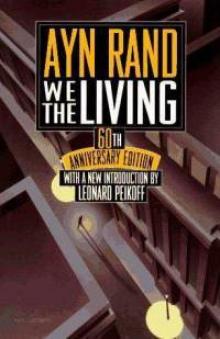 We the Living
We the Living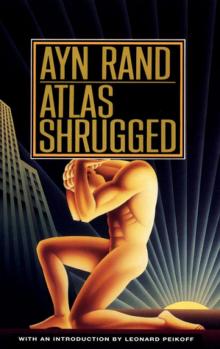 Atlas Shrugged
Atlas Shrugged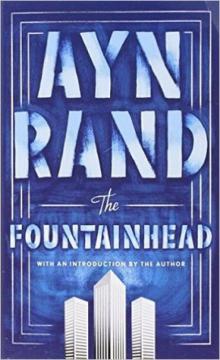 The Fountainhead
The Fountainhead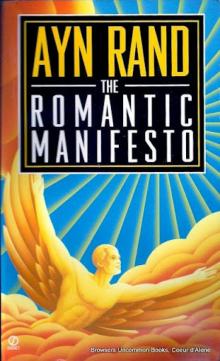 The Romantic Manifesto: A Philosophy of Literature
The Romantic Manifesto: A Philosophy of Literature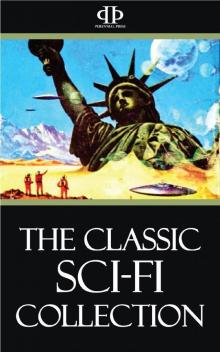 The Classic Sci-Fi Collection
The Classic Sci-Fi Collection The Early Ayn Rand
The Early Ayn Rand